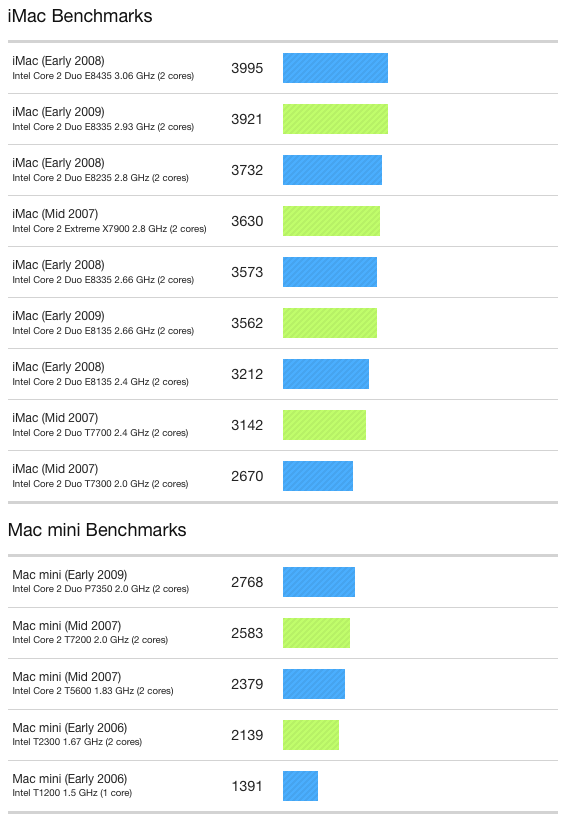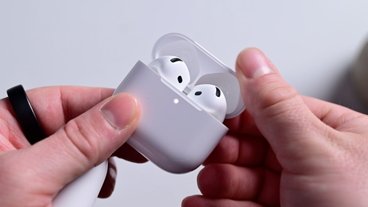Although Apple is touting the performance of its new iMac and Mac mini desktops, a new test shows that newer processors from Intel have had little impact on the computers' true speed.
When clock speeds are identical between systems, such as with the new low-end 2.66GHz iMac and a mid-range predecessor from last year, the difference in test scores becomes almost unnoticeable, coming down to 11 points in the case of the two all-in-ones. Even the 2.93GHz iMac, which replaces a 2.8GHz model, has only a 189-point advantage — or about a 5 percent speed difference that directly maps to the higher clock rate.
The largest relative gain in tests is for the Mac mini, which still only gains about 7 percent despite leaping two generations ahead in processor technology at 2GHz.
Primate isn't shocked by the results as it notes that both of the home computers' performance is dictated by a processor architecture fundamentally identical to what has existed for the past two years. This won't advance for the notebook-grade chips used by Apple until Intel brings its "Nehalem" architecture to the processors through the "Calpella" platform due this summer. As such, the test developer warns that those solely interested in clock speed may want to avoid buying new.
Geekbench tests of the 2009 iMac and Mac mini updates, courtesy of Primate Labs.
"You might be better off getting a discontinued (or refurbished) previous-generation Mac rather than one of the new Mac models," the company says.
However, Primate also acknowledges that Geekbench only tests CPU- and memory speed-intensive features such as floating point math, not video performance. As a result, it's possible for the systems to be much faster in 3D and other areas that depend as much or more on graphics processing, such as the Mac mini's 5X speed-up in moving from the Intel GMA 950 chipset to NVIDIA's GeForce 9400M. The iMac's GeForce 9400M and GT120 are also claimed to accelerate performance over the Radeon HD 2400 and 2600 in older versions.
The tests also downplay disk-related factors such as newer hard drives and more RAM; most of the new Macs have twice as much memory as their predecessors and don't have to page to disk as often as earlier systems.
 Katie Marsal
Katie Marsal




-xl-m.jpg)


-m.jpg)






 Amber Neely
Amber Neely
 William Gallagher
William Gallagher
 Malcolm Owen
Malcolm Owen

 Mike Wuerthele
Mike Wuerthele


 Thomas Sibilly
Thomas Sibilly







246 Comments
But, but, but, but Apple says they're better!
If they're not, why did I stop paying my mortgage so that I could buy 5 each of the newest computers with 2 new iPhones to go with each computer?
I should think Xbench is a better tool in this case.
The tests also downplay disk-related factors such as newer hard drives and more RAM; most of the new Macs have twice as much memory as their predecessors and don't have to page to disk as often as earlier systems.
Not surprising.
The updates were pathetic. I surprised the mini didn't see more of a benefit from the decent 9400 graphics. Just goes to show that cpu speed does count for something and that imply adding a faster fsb and memory only give negligible improvements.
I am beginning to question Apple's commitment to desktop machines at this point. They just don't seem to care.
Not surprising.
The updates were pathetic. I surprised the mini didn't see more of a benefit from the decent 9400 graphics. Just goes to show that cpu speed does count for something and that imply adding a faster fsb and memory only give negligible improvements.
I am beginning to question Apple's commitment to desktop machines at this point. They just don't seem to care.
Did you bother reading the whole article? The tests they ran don't account for any gains that might be present in video speed. They are only talking CPU by itself here, not the whole user experience.
This whole iMac update sucks:
1.) Tapered stand. Woo-hoo!
2.) Same racoon face- the only Mac with this fugly look. Either make it all metal or all black.
3.) White cord and white keys left over from the White Duke.
4.) The godawful mouse.
5.) Keyboard - don't get me started , don't even get me started.
6.) And now these benchmarks???????????
I'm thinking of buying the Mini now- at least I'll save $1,000.